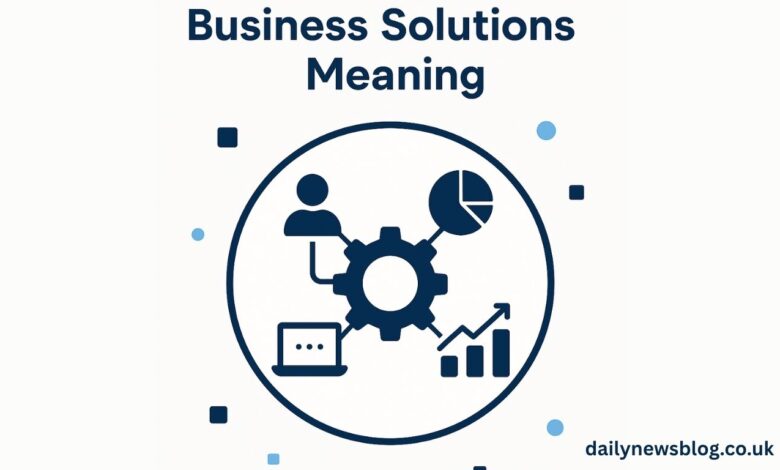Integrated Business Solutions Meaning: Save Time, Work Smarter

In an age where time is money and data is everything, businesses can’t afford to operate in silos. With various departments using different tools and systems, the risk of miscommunication, inefficiency, and errors multiplies. That’s why more companies are investing in integrated business solutions to streamline operations and improve decision-making.
Understanding the Integrated Business Solutions Meaning is a game-changer for business leaders aiming to enhance performance, reduce redundancies, and achieve sustainable growth. This article dives deep into what integrated business solutions are, why they matter, and how they’re transforming companies across industries.
Understanding Integrated Business Solutions Meaning
So, what exactly do we mean by “Integrated Business Solutions Meaning”?
It refers to the concept of merging various business processes and software applications into one coherent system that operates as a unified whole. Instead of running separate platforms for sales, HR, finance, and inventory, an integrated solution brings all these elements under one digital roof.
This integration not only ensures that departments communicate effectively but also that decision-makers have a 360-degree view of business performance. For example, when a sale is made, the integrated system can automatically update the inventory, generate an invoice, notify the finance team, and record customer preferences in the CRM.
In simple terms, integrated business solutions eliminate data silos and allow companies to work smarter—not harder.
Why Are Integrated Business Solutions Important?
Businesses today are more complex and fast-paced than ever before. Managing different software systems for each function results in fragmented data and sluggish workflows. That’s where integrated business solutions make a difference.
Faster Access to Information
With all your systems connected, data is accessible in real-time. Managers no longer need to wait for end-of-month reports or request updates from different departments—they can log in and get insights instantly.
Streamlined Communication
An integrated platform ensures that every team is on the same page. For instance, when marketing launches a campaign, the sales team can instantly see lead responses and adjust their strategy accordingly.
Improved Compliance
Many industries require strict compliance with regulations. Integrated systems help ensure data accuracy and consistency across the organization, making compliance audits easier and more reliable.
Customer Retention and Satisfaction
Customers expect fast, personalized service. With an integrated solution, customer support agents can view a client’s full history—from past orders to previous support tickets—allowing for quick and effective resolutions.
Core Components of Integrated Business Solutions
Integrated business solutions typically consist of several interconnected software systems working together to cover all core areas of business operation.
Enterprise Resource Planning (ERP) Systems
ERP systems are the backbone of many integrated solutions. They combine key functions like accounting, procurement, human resources, and production into one platform.
Example: A manufacturing company can use an ERP system to monitor raw material levels, track factory output, automate payroll, and manage budgets—all from a central dashboard.
Customer Relationship Management (CRM) Systems
CRMs manage how your business interacts with customers and prospects. When connected with ERP systems, CRMs give you a complete view of customer journeys—from first contact to final invoice.
Example: A retail chain integrates its CRM with its e-commerce and inventory systems to track a customer’s online purchases and recommend in-store promotions based on purchase history.
Business Intelligence (BI) and Analytics Tools
BI tools turn your data into visual insights. With integration, these tools pull from multiple systems to offer dashboards, performance metrics, and forecasting tools.
Example: A logistics company uses BI to analyze route performance, fuel consumption, and customer delivery feedback, improving service efficiency.
Supply Chain Management (SCM) Systems
Supply chain platforms manage inventory, procurement, shipping, and logistics. When integrated with ERP and sales data, SCM tools can forecast demand and optimize stock levels.
Example: An electronics distributor integrates sales data with supply chain systems to automatically restock top-selling products before they run out.
Additional Technologies
- HR Management Systems (HRMS) for employee lifecycle management
- Marketing Automation Tools for campaign execution and performance tracking
- Document Management Systems for storing contracts and operational records
- Cloud-based Collaboration Platforms to boost team productivity remotely
The true power of integrated business solutions lies in how these systems communicate and work in harmony.
Benefits of Integrated Business Solutions
Understanding the Integrated Business Solutions Meaning becomes even more impactful when you see how it enhances every part of your operations.
Improved Efficiency and Productivity
Manual tasks like data entry, cross-department reporting, or invoice generation are time-consuming and error-prone. Integration automates these workflows, reducing errors and speeding up delivery.
Enhanced Decision-Making
Real-time access to analytics means better decisions, faster. Whether it’s adjusting inventory levels, targeting a new customer segment, or scaling operations, data-driven choices are more likely to succeed.
Cost Savings
By removing redundancies, optimizing staff usage, and avoiding costly errors, integrated business solutions cut down on unnecessary expenses.
Example: A startup saved over $20,000 annually by moving from five separate tools to a single integrated system for finance, CRM, and email marketing.
Better Customer Experiences
Integration ensures seamless customer experiences—from personalized marketing emails to fast delivery tracking and issue resolution. This consistency builds trust and loyalty.
Scalability and Flexibility
Whether you’re expanding into new markets or launching new services, integrated systems scale with you. You can add modules or users without overhauling your infrastructure.
How Integrated Business Solutions Support Digital Transformation
Digital transformation is about more than just going paperless—it’s about reinventing how your business operates and delivers value. Integrated business solutions support this by:
- Enabling Automation: From order processing to customer follow-ups
- Providing Cloud Access: Allowing remote teams to collaborate effortlessly
- Delivering Real-Time Insights: So executives can pivot strategies instantly
- Ensuring Security and Compliance: With role-based access and audit trails
Example: A mid-size healthcare provider adopted integrated software for patient records, billing, and HR, streamlining administration and allowing doctors to focus more on patient care
Challenges in Implementing Integrated Business Solutions
Despite their advantages, implementation isn’t always easy:
- High Initial Investment: Some platforms require significant upfront costs
- Training and Onboarding: Teams need time to adjust to new systems
- Customization Needs: Businesses may need to adapt systems to their unique workflows
- Data Migration Issues: Old data may require cleaning or formatting before transfer
Overcoming these challenges requires strong project management, vendor support, and clear communication across teams.
Frequently Asked Questions (FAQs)
What is an integrated business solution?
It’s a system that unifies various business processes—like accounting, sales, and HR—into one seamless platform for increased efficiency and data accuracy.
What is a business integration solution?
A business integration solution connects separate software tools, ensuring smooth communication and data flow across departments.
What is the meaning of an integrated business?
An integrated business operates using interconnected systems and processes, aligning different departments to work cohesively toward common goals.
What is the meaning of an integrated solution?
It refers to combining multiple technologies or software applications into one centralized system to simplify workflows and enhance collaboration.
What is an example of an integrated business system?
A retail company using Shopify for e-commerce, QuickBooks for accounting, and HubSpot for CRM—all connected through a middleware platform like Zapier or custom APIs.
What is the difference between ERP and CRM systems?
ERP focuses on internal operations like finance and logistics; CRM handles external customer interactions. Both are essential and more powerful when integrated.
Can small businesses benefit from integrated business solutions?
Absolutely. Affordable cloud-based tools now offer robust integration options tailored to small and medium businesses.
How does integration improve customer service?
By providing a full customer history to agents and sales reps, it leads to faster resolutions, personalized interactions, and better satisfaction.
What role does automation play in integrated business solutions?
Automation handles routine tasks, such as follow-up emails, invoice generation, or report scheduling, reducing human error and saving time.
How long does it take to implement an integrated business solution?
Depending on complexity, implementation can range from a few weeks for basic tools to 6–12 months for enterprise-level systems.
Conclusion
To succeed in a competitive, data-driven world, businesses must streamline operations, minimize inefficiencies, and maximize collaboration. That’s where the Integrated Business Solutions’ Meaning becomes critical.
These systems help unify your tools, people, and data, transforming how your business functions and competes. Whether you’re a small business owner or a corporate executive, it’s time to ask yourself:
Are you still juggling disconnected systems? Or are you ready to unlock the power of integration and future-proof your business?
Stop Wasting Time! Know the Integrated Business Solutions Meaning—and take the first step toward operational excellence and long-term success.
Also Read: Dailynewsblog




